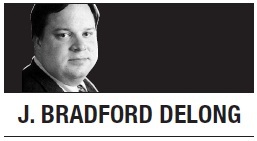 Global superpowers have always found it painful to acknowledge their relative decline and deal with fast-rising challengers. Today, the United States finds itself in this situation with regard to China. A century-and-half ago, imperial Britain faced a similar competitive threat from America. And in the 17th century, the Dutch Republic was the superpower and England the challenger.
Global superpowers have always found it painful to acknowledge their relative decline and deal with fast-rising challengers. Today, the United States finds itself in this situation with regard to China. A century-and-half ago, imperial Britain faced a similar competitive threat from America. And in the 17th century, the Dutch Republic was the superpower and England the challenger.History suggests that the global superpower should aim for a soft landing, including by engaging with its likely successor, so that it still has a comfortable place in the world once its dominance fades. Sadly, US President Donald Trump is no historian. And his incoherent, confrontational approach to China could seriously damage America’s long-term interests.
Like Britain and the Dutch Republic before it, America is the world’s dominant military power, and its reach is global. It has some of the world’s most productive industries, and dominates global trade and finance.
But, also like its predecessors, America now faces a rising power -- a confident, ambitious country that has a larger population, is hungry for wealth and global preeminence, and believes it has a manifest destiny to supplant the current hegemon. And, unless something goes badly wrong, the challenger’s continued rise is all but assured.
Inevitably, conflicts will arise. The up-and-coming superpower wants more access to markets and to intellectual property than the incumbent wishes to provide. And what the incumbent does not willingly give, its challenger will seek to take. Moreover, the rising superpower wants a degree of influence in international bodies commensurate to what its fundamental power will be a generation from now, and not to what it is today.
These are all legitimate disagreements, and the two powers need to manage them by advancing and defending their respective interests. But these tensions do not outweigh the two countries’ common interest in peace and prosperity.
What, then, should the incumbent hegemon do?
In the Anglo-Dutch case, a series of trade skirmishes and naval wars in the 1600s led to a remarkably large number of derogatory expressions entering the English language, such as Dutch book, Dutch concert, Dutch courage, Dutch leave, Dutch metal, Dutch nightingale, and Dutch reckoning. In the long run, though, Britain’s fundamental strengths proved decisive, and the country became a global power. Yet the Dutch created a world in which they were largely comfortable long after their predominance ended.
The Dutch shift from opposing Britain to engaging with it was a crucial factor in this transition. On Oct. 24, 1688, a change in wind direction allowed the Dutch fleet to leave harbor in support of the aristocratic Whig faction in England, thereby ending the would-be absolutist Stuart dynasty. Thereafter, the two powers’ joint interests in limited government, mercantile prosperity, and anti-Catholicism formed the basis of a durable alliance in which the Dutch were the junior partner. Or, as a viral slogan of the 1700s more bluntly put it, there would be “no popery or wooden shoes!” -- the latter being a contemporary symbol of French poverty. And with British backing, the Dutch remained independent, rather than falling involuntarily under French control.
More than a century later, imperial Britain eventually adopted a similar strategy of engagement and cooperation with America. This culminated, as Harold Macmillan unwisely (because too publicly) put it when he was seconded to Gen. Eisenhower’s staff in North Africa during World War II, in Britain playing Greece to America’s Rome. As a result, the US became Britain’s staunchest geopolitical ally of the 20th century.
Today, US policymakers could learn much by studying the actions of the Dutch Republic and Britain when they were global hyperpowers pursuing soft landings. In addition, they should read “The Sources of Soviet Conduct,” the 1947 article by US diplomat George F. Kennan that advocated a US policy of containment toward the Soviet Union.
Three of Kennan’s points stand out. First, he wrote, US policymakers should not panic, but recognize what the long game is and play it. Second, America should not try to contain the Soviet Union unilaterally, but rather assemble broad alliances to confront, resist, and sanction it. Third, America should become its best self, because as long as the struggle between the US and Soviet systems remained peaceful, liberty and prosperity would ultimately be decisive.
But since taking office in January 2017, Trump has steadfastly ignored such advice. Instead of forming alliances to contain China, Trump withdrew the US from the proposed Trans-Pacific Partnership trade deal. And he continues to make random, incoherent demands -- such as immediately eliminating the bilateral US-China trade deficit.
Rather than carefully playing the long game with regard to China, Trump seems to be panicking. And, increasingly, China and the world know it.
J. Bradford DeLong
J. Bradford DeLong, a former deputy assistant US Treasury secretary, is professor of economics at the University of California at Berkeley and a research associate at the National Bureau of Economic Research. -- Ed.
(Project Syndicate)
-
Articles by Korea Herald






![[KH Explains] How should Korea adjust its trade defenses against Chinese EVs?](http://res.heraldm.com/phpwas/restmb_idxmake.php?idx=644&simg=/content/image/2024/04/15/20240415050562_0.jpg&u=20240415144419)












![[Today’s K-pop] Stray Kids to return soon: report](http://res.heraldm.com/phpwas/restmb_idxmake.php?idx=642&simg=/content/image/2024/04/16/20240416050713_0.jpg&u=)